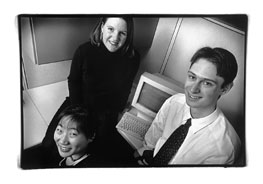Main Menu · Search ·Current Issue ·Contact ·Archives ·Centennial ·Letters to the Editor ·FAQs
 The first three employees of Wiltshire Associates, shown here not in their pajamas. The biotech sleuths, from left, are Cynthia Lin, Landis Fisher, and Christopher Schott. Photograph by Flint Born
The first three employees of Wiltshire Associates, shown here not in their pajamas. The biotech sleuths, from left, are Cynthia Lin, Landis Fisher, and Christopher Schott. Photograph by Flint Born |
During the spring of 1996, Andrew Prihodko '98 walked into the Student Employment Office (SEO) and persuaded the people in charge to let him overhaul the office's website. Prihodko is an economics concentrator and varsity fencer who comes from Odessa and considers Web design only a hobby, though he's also designed "about 90 percent" of the current Crimson website. Having spent the summer after his freshman year on the beach in Ukraine, Prihodko's next summer was employed refining one of the most important resources by which other students find employment.
Thanks to Prihodko's initiative, the SEO website, "https://www.seo.harvard.edu", offers students several new ways to look for work. After indicating their job preferences via a brief onscreen survey, users can either search the database of open positions, or have the system e-mail them information about jobs as they become available. Students seeking temporary work can use the website to register their skills in such areas as typing and editing, foreign languages, and tutoring: a quick search determined, for example, that of the 142 students registered, three are available to translate Arabic.
One of the site's success stories is that of a start-up company investigating small biotechnology firms. "All hell broke loose once we put our ad up on the webpage," says William Adler '61, M.D. "I was looking for kids who were assertive; well, it turns out most Harvard kids are assertive. They're not shrinking violets." Among the 50 or so who applied for the jobs Adler advertised were Landis Fisher '98, a history of science concentrator, Christopher Schott '99, a biomedical engineering concentrator, and Cynthia Lin '00, who concentrates in environmental science and public policy. They became the first three employees of Wiltshire Associates.
The idea for Wiltshire Associates began as Adler neared retirement from the National Institutes of Health. He reasoned that most brokerage houses lack the expertise to assess biotechnology research, and saw an opportunity to start a specialized investment newsletter. He wanted to hire students who could spend a summer interviewing scientists at biotechnology firms around the country and assess the quality of their research.
To help the students conduct their interviews, Adler periodically sent them reports on subjects ranging from statistical analysis, to designer drugs, to cell-surface receptor biology. But his main concern, he says, was the "virtual office" his company was going to occupy. Fisher, Schott, and Lin would live and work near centers of biotechnology ventures--Palo Alto, Bethesda, and Boston--and communicate with him only by e-mail, fax, and phone. "It was a little difficult to get used to at first," says Chris Schott, who was stationed near Boston. "I've never had a job where you could do the majority of your work in your pajamas."
But Adler's venture appears to be working. After ranking the companies they investigated, he and his staff analyzed the results and found that, from June to September of 1997, the stock prices of their top picks had increased a dramatic 70 percent. Last November, a group of money managers became interested in the information Wiltshire Associates had gathered, and asked Adler to run a mutual fund based on the research. He reports that his firm now manages almost $3,000,000--which is, in turn, good news for student employment. Says Adler, "We're probably going to hire 10 students this summer."
~ Daniel Delgado